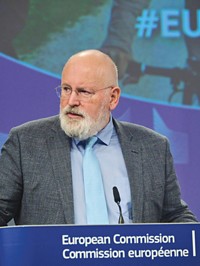Advertisement
Grab your lab coat. Let's get started
Welcome!
Welcome!
Create an account below to get 6 C&EN articles per month, receive newsletters and more - all free.
It seems this is your first time logging in online. Please enter the following information to continue.
As an ACS member you automatically get access to this site. All we need is few more details to create your reading experience.
Not you? Sign in with a different account.
Not you? Sign in with a different account.
ERROR 1
ERROR 1
ERROR 2
ERROR 2
ERROR 2
ERROR 2
ERROR 2
Password and Confirm password must match.
If you have an ACS member number, please enter it here so we can link this account to your membership. (optional)
ERROR 2
ACS values your privacy. By submitting your information, you are gaining access to C&EN and subscribing to our weekly newsletter. We use the information you provide to make your reading experience better, and we will never sell your data to third party members.
Greenhouse Gases
Europe closes in on low-carbon methanol
Two major projects are on track to receive substantial funding from the European Commission
by Alex Scott
April 9, 2021

Two European facilities that would make low- or zero-carbon-methanol are a step closer to securing crucial public funding.
Wacker Chemie and Linde say their proposal to make methanol in Burghausen, Germany, from green hydrogen passed a preliminary funding assessment by the European Commission and the German ministry of the environment. They call the project Rhyme, for renewable hydrogen and methanol.
Wacker and Linde have applied for more than $60 million in funding out of total project costs of about $120 million. The project would combine green hydrogen, made in a 20 MW water electrolysis plant powered by renewable energy, with carbon dioxide emissions from existing production processes to make 15,000 metric tons (t) of methanol annually. Scheduled to be up and running by 2025, the facility would have CO2 emissions 80% lower than what standard methanol plants emit, Wacker says.
“Since a plant complex of this kind is not economically viable at present, we clearly need financial support to realize this breakthrough project,” Wacker CEO Rudolf Staudigl says in a statement about the funding process.
Separately, Project AIR, proposed by Perstorp and partners including the Finnish energy company Fortum, has passed a preliminary assessment by the European Commission. To be built in Stenungsund, Sweden, it would replace 200,000 t per year of methanol made from fossil fuels with low-carbon methanol made from feedstocks including hydrogen from water electrolysis, biomethane, and CO2 from waste emissions.
Slated for start-up by 2025, Project AIR would keep more than 500,000 t of carbon emissions from entering the atmosphere annually, Perstorp says. The company expects a final decision on which projects will receive European funding later this year.



Join the conversation
Contact the reporter
Submit a Letter to the Editor for publication
Engage with us on Twitter